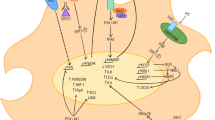Abstract
Background
Fas ligand (FasL) is a well-known death factor; however, the role of FasL in the regulation of human glomerulonephritis remains unclear.
Methods
We investigated the renal expression and localization of FasL in various forms of human glomerulonephritis by immunohistochemistry, utilizing confocal laser scanning microscopy. We further evaluated cytokine-induced FasL expression via nuclear factor (NF)κB in cultured human mesangial cells (HMC). The level of soluble FasL was measured by a specific enzyme-linked immunosorbent assay (ELISA).
Results
The frequency of glomerular FasL-positive cases was higher in lupus nephritis (37.9%) as compared with other forms of glomerulonephritis (8.7%). The glomerular FasL score in proliferative lupus nephritis was significantly higher than that in nonproliferative forms. Patients with a high apoptosis score, severe microhematuria, proteinuria, or decreased renal function had a high FasL score. Double immunolabelling demonstrated that the most prevalent phenotypes of FasL-positive cells were mesangial cells. In cultured HMC, interleukin (IL)1β, lipopolysaccharide (LPS), or γ interferon (IFN) upregulated membrane-bound FasL. IL1β significantly, and LPS or γIFN weakly activated NFκB, but none of these agents activated NFκB/Rel-related nuclear factor of activated T cells (NFATc) or IFN regulatory factor-1. IL1β-mediated NFκB was completely inhibited in the presence of lactacystin, a potent inhibitor of NFκB. Lactacystin-mediated inhibition of NFκB reduced FasL protein levels. Matrix metalloproteinase (MMP)-7, but not other MMPs (1, 2, 3, 8, or 9), significantly sensitized HMC to release soluble FasL after IL1β stimulation.
Conclusions
The results suggest that: (1) upregulation of mesangial FasL may contribute to the glomerular inflammation in proliferative lupus nephritis in vivo; (2) proinflammatory cytokines, in particular IL1β, produced in nephritis can upregulate FasL via the transcription factor NFκB in HMC; and (3) MMP-7-mediated release of soluble FasL could control the mesangial inflammation.
Similar content being viewed by others
Author information
Authors and Affiliations
Corresponding author
About this article
Cite this article
Tsukinoki, T., Sugiyama, H., Sunami, R. et al. Mesangial cell Fas ligand: upregulation in human lupus nephritis and NF-κB-mediated expression in cultured human mesangial cells. Clin Exp Nephrol 8, 196–205 (2004). https://doi.org/10.1007/s10157-004-0301-3
Received:
Accepted:
Issue Date:
DOI: https://doi.org/10.1007/s10157-004-0301-3




